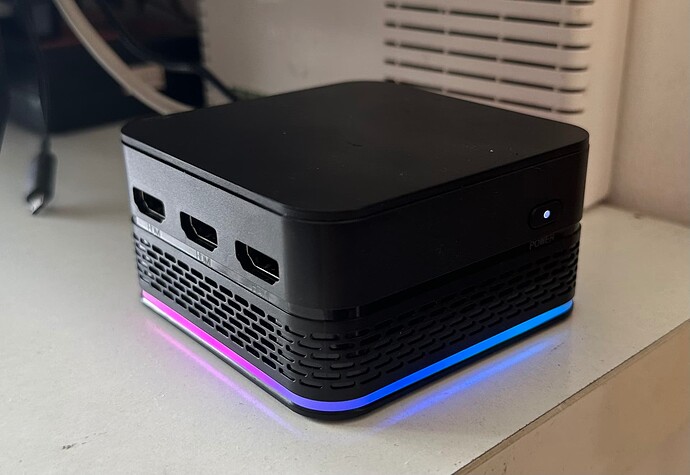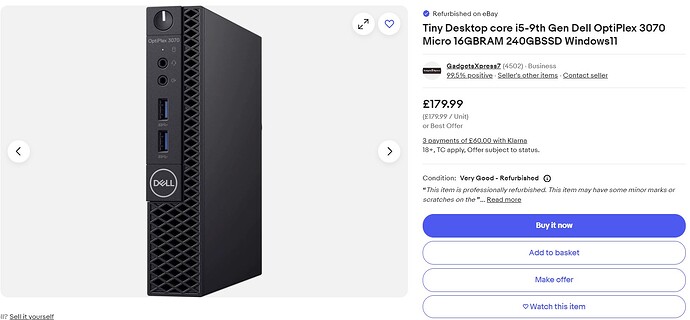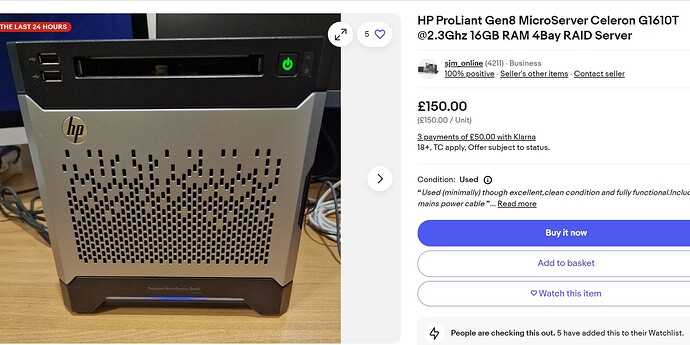Hi. What format is the drive?
I am stuck trying to set up the os on a 7010 with on ssd for the system and services and an hhd for data. SSH alone boot fine into the initial set up. If I add the hhd, the booting get stuck for a while then I get a bunch of errors.
Please create a new topic in the DIY forum for the issue with the 7010.
Hi Plebs,
Running StartOS on Beelink SER8 Mini PC
Processor: AMD Ryzen 7 8845HS
Memory: 32 GB DDR5
Drive: SSD Predator GM7000 4TB M.2 NVME GEN4
and
Intel NUC 11
Processor: Core i7-1165G7
Memory: 32GB DDR4 RAM
Drive: 2TB NVMe SSD Kingstone
Successful non-free install on an HP ENVY Desktop - TE01-1022
Was getting a ‘no wifi instance’ error until I updated the BIOS to F.50
Wish I’d read this thread first ![]()
Start9 fully installed and successfully running the following:
- Bitcoin Core
- Electrs
- Mempool
- LND
- ThunderHub
- Lightning Terminal
The hardware is as follows:
- Trigkey Green G4 Mini PC
- Intel 11th Gen N100 3.4Ghz 4 Core Processor
- 16Gb DDR4 SO-DIMM RAM
- 2TB Crucial MX500 NAND SATA SSD (fitted as additional drive, but BIOS configured to use it as the main boot drive).
Everything has been running fine so far.
Successfully running Start9 non-free install on an HP Elitedesk G3 800 i5 6500.
Replaced the stock 8 RAM & 256GB SSD with 16GM RAM & 2TB SSD.
Everything is running very smoothly.
Installed startos-0.3.5.1-39de098_x86_64-nonfree.iso on a Lenovo T14s Laptop - (16GB RAM / M.2 SSD 500GB + 1TB external SSD.
Holoport - with changing 1TB HDD to 2TB SSD
(Tutorial will be published here when ready sometime this year)
Lenovo Thinkpad T480s NB i5-8350U 1.7GHz - seamless install.
I installed 0.3.5 on a Minix Z100-0dB (16GB RAM / 512 GB SSD + 2TB ssd via usb3, N100 CPU)
No problems whatsoever.
Amazing. Is it still running well?
I have a 3520 that I’m setting up, with 8GB, but only 1TB SATA drive.
Not sure it’s enough for the whole BTC node though, plus other services too…
Successful install of 0.3.5.1 and transfer from a pi to a Dell Optiplex 755, probably 8gb ram and 2TB portable hard drive. It’s an old machine I had around when the pi died.
Also, installed on a Frankenstein Lenovo, may use this for Jellyfin.
Finally put to the old Dell out to pasture! The HD was in dire need of an upgrade so the decision was made to go with new hardware all around.
The new hardware purchased from Amazon:
Beelink Mini PC, AMD Ryzen 7 5825U
Crucial RAM 64GB Kit
Crucial P3 4TB PCIe Gen3 3D NAND NVMe M.2 SSD
I would have purchased a Server One right from Start 9 but they were put of stock at the time I was shopping around!
For the install, I went with Proxmox VE 8.3.2 following Cyph3rp9nk Guide to building a Bitcoin Super Node and I used start9dave suggestion on how the Best way to migrate from one pc to another using the Transfer Data to a New Drive guide .
Everything went smoothly on the new hardware/software side and the only issue I ran into was with my Tor Browser on my remote PC.
I was able to connect to most of my running services over the Tor network with the exception of the main server login. All that would show up is a blank, white screen.
Long story short, I wound up reinstalling the Tor Browser and Tor service on my PC and now all seems fine!
My reasoning for installing StartOS on top of Proxmox is for experimenting with hardware redundancy / high availability / geo-redundancy.
Any feedback would be greatly appreciated.
HAPPY NEW YEAR TO ALL!!!
Dell Inspiron 3520, which I had also swapped out the i5 for an non-officially recommended i7 processor (with 8 cores: works great!). 8GB memory (max for that model), and 1TB SSD drive (Samsung SATA). Seems to work fine for StartOS, for now.
Installed every single available app in the marketplace, full Bitcoin node downloaded (in about a day), and some others downloading data (like Monero). Filled the harddrive quickly. 1TB probably won’t be enough soon. Just in time for the screen to fail (it’s fading…)
EDIT: Although the machine works well, it was running up much of the time, fan blowing hard. I just learned that the down/upload requirements (55GB+/day) exceed the allowable monthly from my ISP (1.2TB/mo). I’m not paying extra each month to the ISP just to support the BTC network, so I’ll have to figure out how to limit the amount of time per day, or days per month to run the node…
Asrock H97M-ITX/ac with an i3-4170. 8GB RAM, 2TB Crucial BX500 SATA SSD. GTX 750ti that refused to let HDMI work, but DVI got an image on the display. I’ve got one or two hiccups that may be related to the fact I’m on my own hardware, I’ll make a separate post for those.
EDIT: Also an old Lenovo IdeaPad P500. Plug-and-play for that one.
My node is running on bare metal Dell Optiplex MFF 3070 | i5-9thGen 6 core | 32GB DDR4 | 2TB NVMe Gen 4 | 1 GbE Ethernet. Optional SATA 2.5" SSD can be plugged in if StartOS can utilise multiple disks in the future. I synced a full node in 11-12hrs on a 100Mbps ISP connection, twice lol.
Mine is similar to the below but with RAM and SSD Upgrades.
Pro’s = relatively low cost for allot of performance. It’s not far off the Start9’s own NUC’s specs but at a quarter of the price!
Con’s = General purpose Desktop so no Hardware RAID, thus no redundancy against disk failure, unless you manually image the disk periodically.
I don’t know how many people are considering/using HP micro servers, but these were very popular in the AV community several years back as a powerful home NAS/DLNA server. Bang for buck (with upgrades) is very high. I’ve had 2 of these for over 5 years, built and upgraded to about £400 TOC each. They haven’t missed a beat in that time, just updates and reboots.
HP Microserver Gen 8 | Xeon E3-1265L V2 (CPU is an upgrade) | 16GB RAM (also upgrade) | 4 x 3.5" SATA HDD | Hardware RAID Controller | ILO (headless management) | Dual 1GbE LAN (w/VLAN) + 1 ILO LAN) | CD/DVD (which with a cable adapter can be converted to a SATA bootable SSD)
Pro’s = Small form factor, enterprise grade + ILO, quiet, can pack allot of kit all in one box (I have 2 equivalent spec running Hyper-V Core in a home lab). Lots of storage, iirc up to 6TB disks supported. The CPU is socket based so can install a Xeon if required. Has extra PCIe sockets for extra/faster RAID or other adapters. Just tested that can host StartOS as a VM without a problem.
Con’s = Old enough that supports 16GB RAM max. The Sata ports are 2 x 3Gbps + 2 x 6Gbps, + 1 x 6Gbps (CD-DVD/extra SSD). Setup requires a bit of effort especially if running Windows core server.
From what I’ve seen the CPU isn’t the limiting factor running a node the Storage is, so the Gen10 Microserver may be a better bet, it’s CPU is not upgradeable and drops ILO, but otherwise it’s a step up form the Gen8 and supports up to 32GB RAM.
My setups are 1TB SATA SSD running of the CD/DVD controller as a storage disk, partitioned for various things. 2 x 6TB HDD’s RAID 1 on the SATA 6Gbps controller with the 2 x 3Gbps slots not used yet). Same for the other one but running 2 x 4TB disks. This is a 5 year old setup.
Nowadays you can install 2 x 4TB 2.5" SATA SSD’s in 3.5" caddys, plug them in and setup RAID 1 and you are off. If you wanted more disks the options are there if the OS can utilise them.
If you want, you can install VMWare on a microSD, plug it inside the server and run a VM hypervisor. Or Hyper-V off a Bootable USB. Its a very versatile bare metal.
successfully running Start9 since OCT24
ASUS PN64 13th Gen Intel Core i5 Barebones Mini PC
Crucial 16GB Single (1x16GB) DDR5 SO-DIMM C40 4800MHz
Crucial P3 Plus PCIe Gen4 NVMe M.2 SSD - 4TB
Possibly overpowered?! Enjoying very smooth operation, no hiccups to date!!
When Blossom either sideload or marketplace so we can host our own media on NOSTR?
I successfully installed start9 OS v0.3.5~1 on a:
Dell Latitude 5590. 32gb Ram. I7-8650. 1Tb SSD
Was very easy. No problems so far, other than me not doing initial setup on a different client PC which made it tricky to get the security certificate off the server later on.
If you remove the s from
https://adjective-noun.local, on machine that does not trust the certificate, it will take you to an instruction page that has a download link for your certificate.


